|
|
|
Sort Order |
|
|
|
Items / Page
|
|
|
|
|
|
|
| Srl | Item |
| 1 |
ID:
128388
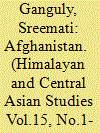

|
|
|
|
|
| Publication |
2011.
|
| Summary/Abstract |
In the context of conventional notion of Afghanistan's foreign policy strategy, two countries are accorded the most prominent status- the U.S. and Pakistan. Russia, on the other hand, shares a unique relationship with Afghanistan. The role of the buffer state, as played out by Afghanistan, during the 19"' century, halted Russian adventure towards ' South Asia, and Russian invasion of Afghanistan proved to be so much of a miscalculated affair as the misadventure led to the collapse of the Soviet Union itself. But even now, Russia has a great stake in Afghanistan's stability and is still considered to be a stabilizing factor in Afghanistan's security scenario. This paper analyzes the different phases of Russian involvement in Afghanistan in t international strategic environment.
|
|
|
|
|
|
|
|
|
|
|
|
|
|
|
|
| 2 |
ID:
128387
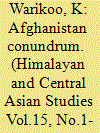

|
|
|
|
|
| Publication |
2011.
|
| Summary/Abstract |
Located at the crossroads of Central, South and West Asia and sharing. its borders with Central Asian Republics of Tajikistan, Uzbekistan and Turkmenistan on the north, Chinese province of Xinjiang in the east, [ran on the west and south west, and Pakistan and Pak-occu pied Kashmir on the south and south east, Afghanistan occupies a unique geo-strategic placement in the region. Distinct ethno-linguistic groups settled in different parts of .»'\fghanistan have diverse social moorings and political affiliations and aspirations. Th us the 'I'ajil
|
|
|
|
|
|
|
|
|
|
|
|
|
|
|
|
| 3 |
ID:
104500
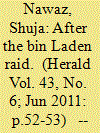

|
|
|
| 4 |
ID:
125004
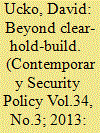

|
|
|
|
|
| Publication |
2013.
|
| Summary/Abstract |
Despite a highly uneven track record, clear-hold-build has remained a dominant, even universal, approach to counterinsurgency. Its prevalence is rooted in its incontestable sequencing of operations and the attendant promise of a linear path towards peace. Yet the appeal of this approach also makes it deceptive and possibly dangerous. Clear-hold-build is not a strategy and must not be mistaken for one, as it has been in Afghanistan, where it inspired false hope for swift progress. Instead, it is necessary to reach a more problematized view of this approach and of what it aims to achieve. This article provides such an evaluation, proposing five principles that should guide its future application. These principles point to the need for a far deeper understanding of how security, development, and governance interact at the local level. Counterinsurgents must understand the relationships between aid and security, between government and governance, and between state and periphery. Where the central government is predatory or lacks support, clear-hold-build also raises difficult questions of authority, legitimacy, and control - questions that counterinsurgents must be capable of answering. Thus problematized, clear-hold-build emerges as a framework with heuristic utility; a schema that can be helpful in planning but which must at the time of application be populated by knowledge, substance, and skill. The implications of these requirements are troubling, particularly for those governments still in the business of armed intervention.
|
|
|
|
|
|
|
|
|
|
|
|
|
|
|
|
| 5 |
ID:
029643
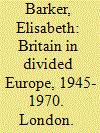

|
|
|
|
|
| Publication |
London, WeidenFeld and Nicolson, 1971.
|
| Description |
316p.Hbk
|
| Standard Number |
0297004018
|
|
|
|
|
|
|
|
|
|
|
|
Copies: C:1/I:0,R:0,Q:0
Circulation
| Accession# | Call# | Current Location | Status | Policy | Location |
| 007987 | 941.085/BAR 007987 | Main | On Shelf | General | |
|
|
|
|
| 6 |
ID:
114612
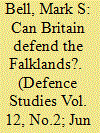

|
|
|
|
|
| Publication |
2012.
|
| Summary/Abstract |
Britain's ability to defend the Falkland Islands from Argentina has been repeatedly challenged by former military leaders and analysts. These concerns have been driven by British defence cuts, the discovery of hydrocarbon reserves close to the Falklands, and increasingly bellicose Argentine rhetoric and actions. This paper evaluates Argentina's capacity to launch an attack on the Falklands and the British capacity to defend against such an attack. Argentina's ability to threaten the Falklands is limited, because Argentina cannot easily neutralise British air superiority over the islands. Even if Argentina could do so, Argentina would find it difficult to bring sufficient troops onto the islands to threaten the Mount Pleasant airfield, or prevent British reinforcements from arriving. Although Britain's current military posture is reasonable, Britain needs a political strategy to counter an Argentine campaign of low-level harassment.
|
|
|
|
|
|
|
|
|
|
|
|
|
|
|
|
| 7 |
ID:
132552
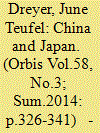

|
|
|
|
|
| Publication |
2014.
|
| Summary/Abstract |
According to integration theory, growing economic interdependence between China and Japan should have spilled over into more cordial political relations. The opposite occurred, as summarized in the phrase "hot economics, cold politics." Even as both sides acknowledge the value of cooperation for shared benefit, commercial and strategic rivalries have intensified, calling into question the validity of integration theory.
|
|
|
|
|
|
|
|
|
|
|
|
|
|
|
|
| 8 |
ID:
128088
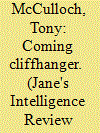

|
|
|
|
|
| Publication |
2012.
|
| Summary/Abstract |
As democratic president Barack Obama begins his second term in the White House, his administration will need to evaluate its many foreign policy agendas.
|
|
|
|
|
|
|
|
|
|
|
|
|
|
|
|
| 9 |
ID:
129540
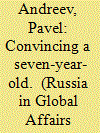

|
|
|
|
|
| Publication |
2014.
|
| Summary/Abstract |
Russia's ideology should be based on the will to defend its traditional values, sovereignty and justice rather than the negation of all other ideas. A positive agenda is more likely to be attractive and influential than a strategy of repulsion.
Soft power has emerged as a popular topic of discussion in the Russian political and expert communities in recent months. There is much talk about the tools of soft power - the Foreign Ministry, the Federal Agency for the Commonwealth of Independent States, Compatriots Abroad and International Humanitarian Cooperation (Rossotrudnichestvo), the media, and various foundations and institutions. Not to be overlooked, however, is the importance of narrative, that is, the conceptual way we talk about the country's current state, its values and geopolitical orientation. Narrative is the fabric that puts together the diverse soft power institutions which collectively form a single information "fist."
|
|
|
|
|
|
|
|
|
|
|
|
|
|
|
|
| 10 |
ID:
088770
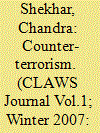

|
|
|
| 11 |
ID:
132044
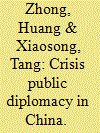

|
|
|
|
|
| Publication |
2014.
|
| Summary/Abstract |
Leon Trotsky, founder of the Soviet Red Army, once lamented "You Lmay not be interested in war, but war is interested in you".' His words are highly relevant to crisis public diplomacy today. Although not enough attention is paid to it, crisis public diplomacy is destined to become vital and complementary to other diplomacies in an era of frequent crisis. It mestic diplomatic strategies and appears to be very conspicuous in international affairs. This was clearly indicated in the report made by former General Secretary Hu Jintao at the 18th Congress of the CPC (Communist Party of China), as follows: "At present, as the global, national and our Party's conditions continue to undergo profound changes, we are faced with unprecedented opportunities for development as well as risks and challenges unknown before." Having a clear understanding of different situations, guarding against risks, dealing with challenges, solving crises and exploiting opportunities have become very real issues. China needs to follow the trend and engage in crisis public pressing times. Through overall coordination it will be control crises. and establish a positive image plays a prominent role in do diplomacy in these able to erase risks to security
|
|
|
|
|
|
|
|
|
|
|
|
|
|
|
|
| 12 |
ID:
122484
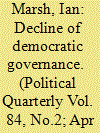

|
|
|
|
|
| Publication |
2013.
|
| Summary/Abstract |
Why has democratic governance declined, at least in the Anglo-American world? This essay maps the causes. It starts with the major parties, once basic agents of mass mobilisation and representation. It argues that a cascading series of developments, often involving contingent adjustments to immediate exigencies, have, in a longer perspective, created a fundamental gap between the political system and its publics. A second section then sketches paths to democratic renewal. How might this gap be closed? What other changes might be required to make this a reality? Are prospects of change fanciful?
|
|
|
|
|
|
|
|
|
|
|
|
|
|
|
|
| 13 |
ID:
133105
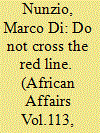

|
|
|
|
|
| Publication |
2014.
|
| Summary/Abstract |
Only five years after it lost a national election in Addis Ababa, the overwhelming victory of the Ethiopian People's Revolutionary Democratic Front (EPRDF) in the 2010 general elections marked the defeat of the opposition parties and the return to a dominant-party state. The capacity of the EPRDF to mobilize people in towns and the capital city triggered debates on the nature of consent in urban Ethiopia. This article contributes to this debate in two ways. First, it maps the specific institutions and strategies the ruling party has used to close political space in the capital since 2005, explaining how it has tied political mobilization to the delivery of services to those at the bottom of urban society. Second, it examines interactions between the ruling party and young people involved in government development programmes and youth organizations, demonstrating the subtle ways dissent is expressed even as EPRDF power is reproduced. In this regard, the victory of the ruling party in 2010 does not bear witness to the neutralization of dissent. Rather, it reveals a reshaping of the way the government has governed and controlled the city since the late 1990s.
|
|
|
|
|
|
|
|
|
|
|
|
|
|
|
|
| 14 |
ID:
128400
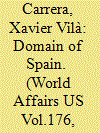

|
|
|
|
|
| Publication |
2014.
|
| Summary/Abstract |
A specter is haunting Spain. It comes from a promise made on November 13, 2003, by José Luis Rodríguez Zapatero, then secretary general of Spain's Socialist Party and a candidate for prime minister of the country. "I will support any reform of the Catalan Statute of Autonomy approved by the Catalan Parliament," he told twenty thousand people gathered in Barcelona's Palau Sant Jordi, referring to the law that oversees the government of Catalonia. Then, to the delight of an astonished audience, he went on to recite, in Catalan, a verse by the beloved poet Miquel Martí i Pol. Zapatero's words resonated strongly among the left-wing establishment poised to make history in the Catalan election three days later.
|
|
|
|
|
|
|
|
|
|
|
|
|
|
|
|
| 15 |
ID:
129992
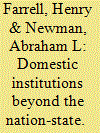

|
|
|
|
|
| Publication |
2014.
|
| Summary/Abstract |
What is the relationship between domestic and international politics in a world of economic interdependence? This article discusses and organizes an emerging body of scholarship, which the authors label the new interdependence approach, addressing how transnational interactions shape domestic institutions and global politics in a world of economic interdependence. This literature makes three important contributions. First, it examines how domestic institutions affect the ability of political actors to construct the rules and norms governing interdependent relations and thus present a source of asymmetric power. Second, it explores how interdependence alters domestic political institutions through processes of diffusion, transgovernmental coordination, and extraterritorial application and in turn how it changes the national institutions mediating internal debates on globalization. Third, it studies the shifting boundaries of political contestation through which substate actors affect decision making in foreign jurisdictions. Given the importance of institutional change to the new interdependence agenda, the authors suggest several instances where historical institutionalist tools might be exploited to address these transnational dynamics, in particular, mechanisms of cross-national sequencing and change strategies of substate actors. As globalization continues, it will be ever more difficult to examine national trajectories of institutional change in isolation from each other. Equally, it will be difficult to understand international institutions without paying attention to the ways in which they both transform and are transformed by domestic institutional politics. While the new interdependence approach does not yet cohere as a single voice, the authors believe that it offers an innovative agenda that holds tremendous promise for both comparative and international relations research as it calls on scholars to reconsider the dynamic nature of globalization for global politics.
|
|
|
|
|
|
|
|
|
|
|
|
|
|
|
|
| 16 |
ID:
129634
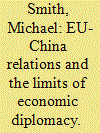

|
|
|
|
|
| Publication |
2014.
|
| Summary/Abstract |
This paper addresses a key problem in EU-China economic relations: the capacity of the EU to exert leverage through its economic diplomacy in the context of key economic trends, policy dilemmas, and processes of governance. The paper begins by identifying key elements of the EU's economic diplomacy and their relationship to key functions: deliberation, representation, communication, and negotiation. It continues by reviewing key trends and challenges in EU-China economic relations, in terms of trade, finance/investment, and broader issues of economic performance, with special reference to the problems emanating from the current economic turbulence both in the EU and in the broader global political economy. It then identifies a number of key policy dilemmas for the EU in areas such as trade defense/trade promotion, environment/development, security/commercial priorities, nvestment/sovereignty, and explores these in terms of three key concepts: orientation, coordination, and effectiveness. In pursuing this analysis, the paper relates these trends and dilemmas to attempts to govern EU-China economic relations: public/private, bilateral/multilateral, and regulatory/political. In the final section of the paper, these efforts are evaluated in the context of the EU's economic diplomacy, with relation to key actors, processes, and outcomes and to the key functions of deliberation, representation, communication, and negotiation.
|
|
|
|
|
|
|
|
|
|
|
|
|
|
|
|
| 17 |
ID:
131951
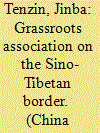

|
|
|
|
|
| Publication |
2014.
|
| Summary/Abstract |
This article investigates the role of the Moluo Tourism Association in Suopo township, Danba county, Sichuan. It examines its organization, internal structure and objectives, and explores the concerns of Tibetan elites and villagers and their strategies for advancing their political and other goals in an officially sanctioned framework. The research shows that the association resembles a "state-led civil society" as its membership and agendas exhibit the strong will of the local state; nevertheless, it still manages to carve a space for expressing negative opinions towards the local authorities, pursuing the "Eastern Queendom" cause and following its own agendas. The dynamic and nuanced interactions between the association and township show that state-society relations in China are situated in a complex and convoluted landscape which has not yet been fully explored in the China field. Furthermore, the article brings to light the divergent interests and positions of the association members as well as the heterogeneity of Suopo society proper. It concludes with a brief discussion of the prospects for an enhanced engagement of ethnic research with broader China studies.
|
|
|
|
|
|
|
|
|
|
|
|
|
|
|
|
| 18 |
ID:
128860
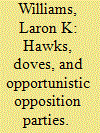

|
|
|
|
|
| Publication |
2014.
|
| Summary/Abstract |
Parliamentary regimes offer the unique opportunity for opposition parties to react to foreign policy by proposing no-confidence motions (NCMs). The threat of an NCM bringing down the government may be enough to induce pacific behavior by the executive. Yet, this simplistic characterization neglects the possible electoral motivations of opportunistic opposition parties. I develop a theory that opposition parties respond to involvement in international conflict by proposing NCMs as a tool to influence voters' opinions with an eye toward the next election. I develop two expectations based on policy disagreement and issue ownership that I use to explain the electorally motivated decision to propose NCMs following conflict. I test these expectations with a dataset of 14 European parliamentary democracies from 1970 to 2001. The empirical evidence suggests that the partisanship of both the government and opposition parties interact to create varying electoral incentives to propose NCMs based on issue ownership. Right-wing opposition parties are more likely to challenge than left-wing parties, and this effect is exacerbated when facing left-wing governments. This study has important implications that underpin a number of theories of the domestic causes of international conflict as well as implications for the study of party strategy.
|
|
|
|
|
|
|
|
|
|
|
|
|
|
|
|
| 19 |
ID:
036638
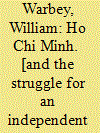

|
|
|
|
|
| Publication |
DelhI, Rupa and Co., 1972.
|
| Description |
ix, 274p.Hbk
|
|
|
|
|
|
|
|
|
|
|
|
Copies: C:1/I:0,R:0,Q:0
Circulation
| Accession# | Call# | Current Location | Status | Policy | Location |
| 010482 | 923.1597/WAR 010482 | Main | On Shelf | General | |
|
|
|
|
| 20 |
ID:
128868
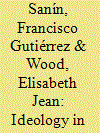

|
|
|
|
|
| Publication |
2014.
|
| Summary/Abstract |
How important is ideology for the analysis of civil war? In contrast to literature that neglects ideology in its emphasis on structural variables or situational incentives, this article argues for the recognition of its essential role in the functioning of armed groups if they are to explain observed variation in armed group behavior. For example, sidelining ideology leaves major phenomena unexplained, including both mass killing and restraint in violence against civilians. Ideology is defined as a set of more or less systematic ideas that identify a constituency, the objectives pursued on behalf of that group, and a program of action (perhaps only vaguely defined). Ideology matters in two ways. First, it has instrumental value for armed groups, socializing combatants with heterogeneous motivations into a coherent group, dampening principal-agent problems, prioritizing competing goals, and coordinating external actors including civilians. Ideologies differ in the kind of institutions and strategies they prescribe for meeting these challenges and in the extent to which they do so. Yet this first approach is incomplete, as ideology has more than instrumental value. Members of some armed groups act on normative commitments in ways not reducible to instrumental reasoning, and some groups constrain their strategic choices for ideological reasons, often normative concerns prescribed by their ideology. Some groups, for example, engage in restraint, declining to use violence though it would have strategic benefit. The conclusion lays out a twin-fold research agenda: a 'weak program' that analyzes the instrumental adoption of ideology and a 'strong program' that explores normative commitments based on particular ideologies and on social preferences.
|
|
|
|
|
|
|
|
|
|
|
|
|
|
|
|
|
|
|
|
|